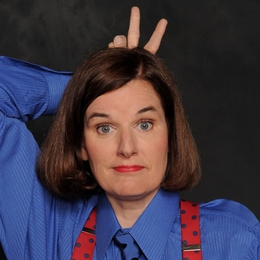
When you have 16 cats and find yourself “sifting through litter boxes four to five times a day,” the jokes tend to write themselves. That’s life for Paula Poundstone, one of the country’s best-known standup comics for more than three decades.
Whether she is seen live at one of her on-stage performances—she’s on the road approximately 90 days a year, mostly over weekends—or heard over the radio as a panelist on National Public Radio’s beloved quiz show “Wait Wait … Don’t Tell Me!,” Poundstone isn’t likely to be confused with anyone. Her comedy is bold, mostly clean—“I don’t talk about sex,” she says, “because I don’t have sex”—and always on target.
We caught up with Poundstone in advance of her two performances at the Sellersville Theater in Bucks County on February 7. She spoke about her 34-year career as a standup comic, her clowder of cats (which fans can see via a 24-7 webcam that streams to her website) and, of course, the necessity of having to tell people that it’s not OK to hit other people with canes.
SL: You’re a frequent panelist on NPR’s “Wait Wait … Don’t Tell Me!” Is that as much fun as I think it is?
PP: It’s a blast. You sit in a chair and are lobbed topics. I feel like being up there is like being a batter in a batting cage, where sometimes you swing and miss, but there is the rare occasion that you connect and it goes out toward the cheap seats.
SL: It seems audiences are much more comfortable interacting with performers now. How is doing standup now compared to, say, 20 years ago?
PP: I’m not sure it has changed in my arena. Thank goodness I was able to get out of the clubs, and now people come to see me specifically. I get a huge return audience, and luckily they bring others. … I’d like to keep being able to do my job for a long time, because I have the greatest crowd in the world. … My crowds are generally really well behaved. Funny story: When I’m on the road, I tend to get picked up [by a car at the airport] by people I don’t know. I was playing once at a theater in Maine and I was asking the driver what shows go well, and he was saying they just had in the Metropolitan Opera, which is hugely popular. He was saying it has terrible problems with the audience, so much that there’s a list of rules and on that list is a rule stating that there is no hitting people with canes.
As a culture, as a whole, we’ve gotten used to watching whatever form of entertainment we choose to watch in private, so I think we have lost the rules of civility that are involved in going out. My crowd doesn’t fall into that category. I think I have the classiest crowd.
SL: How has age, experience and being a parent affected your approach to comedy?
PP: Some of my cynicism has been modified a good deal. For example, when I was younger I couldn’t stand babies on an airplane. Before, if I were to be offered a babies or no-babies flight, I would wait a day to go home on the no-babies flight. Now I love babies so much. … I was on a plane once with my son, who was a baby at the time, and I had to use the bathroom. There was a guy beside me who was a nice guy, and he said, “If you need to use the bathroom, I’ll look after your baby.” So I did and it turned out that the guy sitting next to me was Tommy Chong [of Cheech and Chong]. … But anyway, now I happen to love babies. I used to find them an imposition, but the section of my act where I used to talk about that is gone.
SL: What’s the secret to a long, successful career in standup?
PP: I hope I know. I want to be Tony Bennett, where I’m working for three generations of people. That’s true to a degree now but not enough to sustain life. I think it has to do with doing what’s in your heart. … I don’t take it for granted for one [flipping] second. Even when I’m sifting litter boxes four to five times a day—I have 16 cats and two German shepherds—and I have calluses on my hands from cleaning litter boxes, I am thankful. … Even at its worst I’m the luckiest person in the world, because I get to go on stage and make jokes about it.


